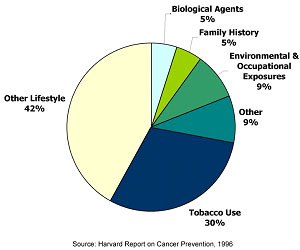- Cancer Overview
- Direct Incidence Rates
- SIRs
- FAQs
- Related Links
- Radon Risks and Lung Cancer in Non-Smokers
A risk factor is anything that is related to a person's chance of developing cancer. Some risk factors can be controlled while others cannot. Risk factors include hereditary conditions, medical conditions or treatments, infections, lifestyle factors, or environmental exposures.
- Did You Know?
-
Approximately 9% of all cancer deaths are thought to be related to environmental or occupational exposures.

Different cancers have different risk factors. For example, excess exposure to sunlight is a risk factor for skin cancer; oral tobacco use is a risk factor for mouth, throat, and many other cancers. Although risk factors can influence the development of cancers, most do not directly cause cancer. An individual's risk of developing cancer may change over time due to many factors and it is likely that multiple risk factors influence the development of most cancers.
The risk factor summaries on this page are designed to serve as a general fact sheet. For more information on other possible risk factors and health effects being researched, please visit the American Cancer Society website. Knowing the risk factors that apply to specific cancers and discussing them with your health care provider can help in making more informed lifestyle and health care decisions.
Check back periodically as new information is added to this page.
